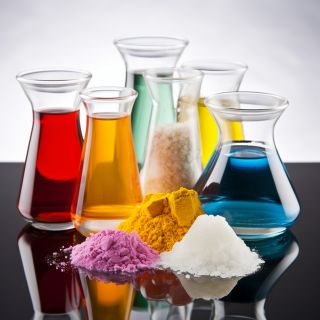Microbiome
4 Ways Food Additives Can Be Hazardous to Your Health
Why you don't keep carboxymethylcellulose in your kitchen.
Posted February 27, 2024 Reviewed by Ray Parker
Key points
- A new study finds food additives alter the composition of your microbiome.
- This alteration may cause excess intestinal permeability, the so-called “leaky gut.”
- A leaky gut can lead to systemic inflammation, affecting all the organs of your body.
“Technological progress has merely provided us with more efficient means for going backwards.” —Aldous Huxley
Progress is supposed to be a continuous march toward a healthier and brighter future. But in fact, we have seen an alarming increase over the years in chronic diseases and associated psychological impairments. What's going on?
The answer, according to hundreds of studies, is partly related to our food production and consumption. When you go to the store and compare a turnip to mac and cheese, which makes you drool? That's the magic of processed food, deviously engineered over decades to be uber-delicious.
What chance does a poor turnip have? The vegetable section can't hold a candle to the lip-smacking goodness in the center of the store. What do you even do with a turnip?
Food manufacturers have a remarkable toolkit of additives that they use to make their food irresistible. Among them are emulsifiers, artificial sweeteners, food colorings, and nanoparticles. These are mostly synthetic chemicals, not things most people have in their kitchens. That might be a warning right there. We should probably be circumspect about eating things more likely to be found in a laboratory than in a kitchen.
All of these substances are approved by the Food and Drug Administration (FDA) because they don't cause any direct damage to your body. However, the FDA doesn't look at what happens to the collection of microbes in your gut, which is called the microbiome. And that may be the heart of the problem. The manufacturing toolkit could be killing our microbes, leading over time to indirect systemic damage.
A recent review of the literature by Benoit Chassaing, Kevin Whelan, and colleagues discovered exactly that. They found evidence that certain additives affect our microbiome and, thus, our gut lining, increasing the odds of inflammation and disease, including psychological problems.
Here are the four additives and what they do to your gut microbes.
Emulsifiers, including polysorbate 80, carboxymethylcellulose, and carrageenan. These are substances added to improve mouth feel and to help mix oily and watery substances. These have been known to kill beneficial bacteria, decreasing bacterial diversity. That's a bad development: A rich assortment of microbes makes for a more resilient community. Emulsifiers also degrade the mucous layer, allowing bacteria to attack the cells lining the gut. This is enough to encourage a leaky gut, possibly leading to colitis and other bodily inflammations. Several animal studies have shown that emulsifiers can lead to changes in the microbiome, as well as changes in behavior.
Artificial sweeteners, including aspartame, sucralose, and saccharin. Manufacturers know that we love sugar, even in places where it doesn't belong. However, some of these synthetic sugars decrease bacterial diversity and can lower the amount of healthy short-chain fatty acids produced by beneficial bacteria. They can also improve the odds of a leaky gut, which may lead to colitis-associated inflammation. Over time, this could also lead to systemic inflammation, potentially affecting every organ in the body. It's worth noting that the review's authors found it difficult to interpret some of the sweetener studies, so more research is merited.
Food colors, including red 40 and yellow 6. Part of the appeal of processed food is how beautiful it can be (I'm looking at you, neon-orange Cheetos.). But these artificial chemicals can be digested by gut microbes, many of which then produce inflammatory metabolites.
In the quantities we usually consume, these chemicals are judged to be safe. But the fact that they have a negative effect on our gut microbes is somewhat concerning. Fortunately, these two petroleum-derived food colorants are not the most popular food additives. But it is likely that we are overusing colorants—which have no nutritional value—solely for visual appeal.
Nanoparticles, including titanium oxide, aluminum silicate, and silicon dioxide. These particles prevent powders from caking. Titanium oxide also imparts a lovely white color to some foods and toothpaste. But these particles also kill off important beneficial bacteria and can trigger inflammation. The particles are small enough to sneak right into gut cells, where they cause the release of damaging reactive oxygen molecules. Fortunately, many of these tiny particles are being phased out, and some jurisdictions have banned titanium oxide in food.
The irony here is that while these substances make things beautiful and delicious, they are completely unnecessary as food constituents. This is why we don't have them in our own kitchens. They can damage our microbiome, leading to systemic inflammation, which is the source of many chronic diseases, among them heart disease, diabetes, obesity, arthritis, and more.
And, via the gut-brain axis, inflammation also leads to depression, anxiety, and dementia. These additives make processed food beautiful and irresistible, but they probably don't belong in our stomachs.
This review of the research shows that these chemicals are inflammatory, and the more you eat them, the more inflammation you risk. By the same token, you can probably eat a small amount of them without any lasting damage, as long as you offset them on occasion with something from the vegetable aisle.
In particular, look for vegetables high in fiber. These include asparagus, onions, lentils, broccoli, beans, and berries. Your microbiome converts fiber into short-chain fatty acids that are both medicine and nourishment for the cells lining your intestines. With your gut intact and healthy, inflammation is kept at bay.
Also handy for counteracting the effects of additives are fermented foods. These foods contain bacteria that contribute to the health of your microbiome. They may not set up permanent homes in your gut, but they do a lot of good as they travel through.
It may seem that the food manufacturers have us in their pocket, but just knowing about the problems may cause us to eat less of these products. And that, in turn, should lead manufacturers to pursue healthier options. Ultimately, we consumers are in charge. We just need to know which direction to take.
In the meantime, visit your vegetable section every once in a while. You might even try a turnip. They're good, like a radish on steroids. Who knew?
Facebook/LinkedIn image: Rizky Rahmat Hidayat/Shutterstock
References
Whelan, Kevin, Aaron S. Bancil, James O. Lindsay, and Benoit Chassaing. “Ultra-Processed Foods and Food Additives in Gut Health and Disease.” Nature Reviews Gastroenterology & Hepatology, February 22, 2024, 1–22.





